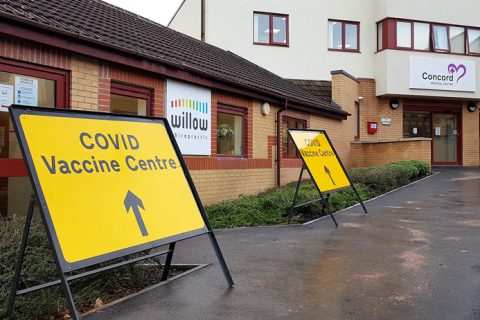
A 23-year-old nurse at Stoke Gifford Medical Centre who had to undergo treatment for skin cancer is urging people to enjoy the sun safely this summer.
Luke Packer was successfully treated for melanoma skin cancer in 2018 when he noticed a mole on the side of his face had changed shape and appearance.
Now the nurse is determined to raise vital awareness as latest figures show around 2,000 people in the South West are diagnosed with melanoma – the most serious form of skin cancer – each year.
Luke, who lives in Westerleigh and works as a team lead nurse at the Stoke Gifford doctors’ surgery, explained:
“At the start of 2018, when I was looking after my great-grandmother as her full-time carer, I just didn’t feel right. I was tired, had aching muscles and wanted to sleep all the time.”
“I had always had a mole beside my left temple, and overnight it became swollen, and one morning I woke up with a little bit of blood on my pillow. But I didn’t think anything of it, and it was July before I went to the doctor.”
“My GP fast-tracked me to the hospital, where they asked if I had any skin cancer in the family, but we have no history of any form of cancer.”
“When the mole was removed and sent for a biopsy, I was told it hadn’t spread – but a check-up six months later revealed that it had.”
“In December that year, my great-grandmother passed away, and just a few days later I was back in hospital for more surgery to remove cancerous tissue where the mole had been. Now, I’m self-monitoring and I recently qualified as a registered nurse.”

Luke has now joined forces with partners Cancer Research UK and NIVEA SUN, who are offering advice and tips on how people can protect their skin from the sun’s rays.
While UK skin cancer rates are rising, particularly in men, almost 9 in 10 cases could be prevented by being safe in the sun and using a combination of shade, clothing and sunscreen to avoid burning.
Taking these three simple steps helps to minimise the risk of lasting damage to DNA in skin cells, which can lead to skin cancer.
Luke says it really is “easy as 1,2,3” and, following his emotional cancer journey, is keen to underline the importance of the message.
“I hope I can encourage people to think about their sun habits and take precautions. Sunburn doesn’t just happen abroad or on summer holidays. It can happen in the UK, even on a cloudy day. It’s tempting to want to make the most of warm weather but getting sunburned increases your chance of getting skin cancer – so it’s really important that people take care. Now I always try and stay out of the sun, wear a hat, make sure my shoulders are covered and that I’ve got my sunscreen with me.”
“It’s really spurred me on to want to help others and spread the word about skin cancer prevention and early detection too. It could make all the difference, so I always encourage people to be safe in the sun and see their GP if they notice any unusual changes to their skin.”
Anyone can get sunburnt or develop skin cancer, but some people are at a higher risk and need to take more care in the sun.
Those at higher risk include people with fair skin and hair, or light-coloured eyes, as well as people with lots of moles and freckles or a family history of skin cancer.
Karis Betts, health information manager at Cancer Research UK, advises:
“It’s important to remember the sun isn’t only strong abroad. It can be strong enough in the South West and across the UK to burn between mid-March and mid-October and is strongest during the middle of the day, not when it’s hottest.”
“Avoid getting caught out by checking the UV index on the weather forecast or online. If it’s 3 or above it’s time to think about sun safety – especially if you have light or fair coloured skin or burn easily.”
“Whether you’re abroad, having a staycation or just out-and about, remember the three-step method to enjoy warm weather safely – cover up, seek shade and regularly apply sunscreen.”
Cancer Research UK and NIVEA SUN are celebrating 10 years in partnership having raised millions for vital skin cancer research. Their top tips for staying safe in the sun are:
1. Seek shade
Between the hours of 11am-3pm in the UK
2. Cover up with clothing
Wear a T-shirt, hat and sunglasses
3. Apply sunscreen
Regularly and generously apply one with at least SPF 15 and 4 or more stars
For more information and tips, visit cruk.org/sunsafety

